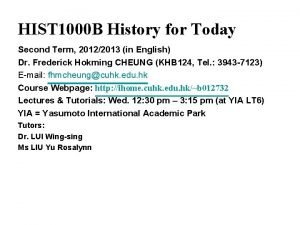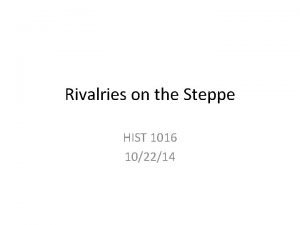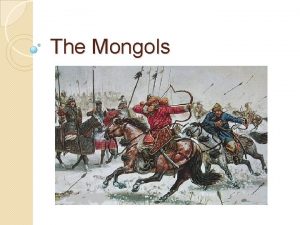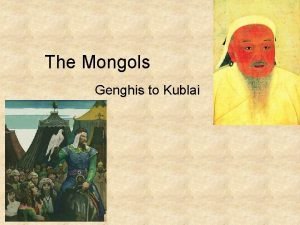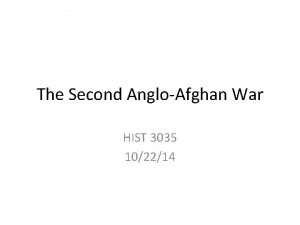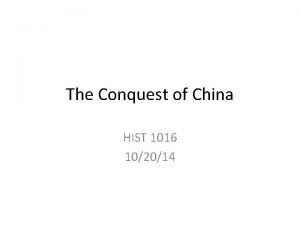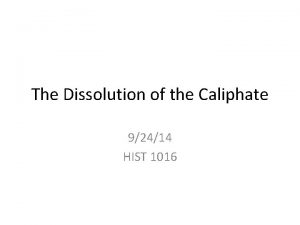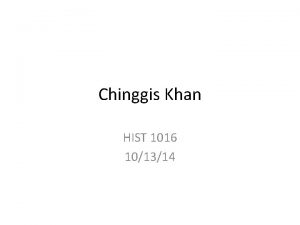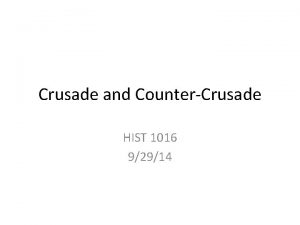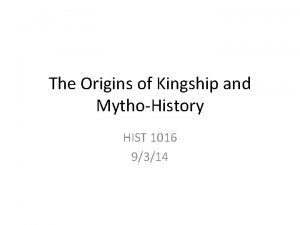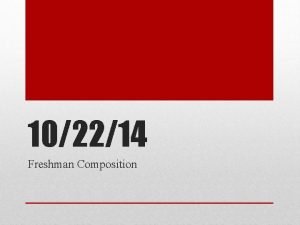Rivalries on the Steppe HIST 1016 102214 IlKhanid























- Slides: 23

Rivalries on the Steppe HIST 1016 10/22/14

Il-Khanid Architecture Tomb of Öljaitü (r. 1304 -1316) in Soltaniyeh, Iran The dome alone is 161 ft. tall!

Il-Khanid Architecture Gunbad-i Ghaffariyya, Maragha, Iran, tomb of a slave governor of Maragha, Iran

Il-Khanid Architecture Tomb of Shaykh Safi al-Din, Ardabil, Iran (ancestor of the Safavid Dynasty (r. 1501 -1736))

Il-Khanid tile work

Decorative Arts

Il-Khanid Painting

Rise of the Toluids • Möngke orders brothers to lead new campaigns • Hülegü Khan and the Il-Khans in Middle East • Khubilai Khan and the Ta-Li Campaign – Ta-Li (Dali Kingdom) – non-Chinese (Bai) kingdom – Border between China and South Asia – First major campaign – Promise no pillaging or slaughter if Ta-Li surrenders Early portrait of Khubilai Khan

Khubilai in Northern China • Viceroy of Northern China • T’un-t’ien: Chinese military farms – Soldiers both occupy and farm • Nan-ching (Nanjing) vs. Ching-chao (Xi’an) – Larger population vs. more fertile land • Pacification Commissioners – local notables allied with Khubilai – Curb the violent and support the weak

Khubilai, Confucianism, and Buddhism • Reliance on mix of Confucian and Buddhist advisors • Chabi – Khubilai’s second wife, Tibetan Buddhist • Chinese textual records – Khubilai and the Mandate of Heaven – Advisors as Confucian sage • 1250’s - Taoist-Buddhist Debate

Khubilai, Confucianism, and Buddhism • Hai-yün (1202 -1257): Zen Buddhist monk – 1242: brought to Khubilai’s court in Karakorum – Instructed Khubilai in Confucian principles of governing – Three Teachings: Confucianism, Taoism, and Buddhism • Yao Shu (1203 -1280): Confucian adviser – Models of Chinese emperors – Prevents massacres in Ta-Li • Liu Ping-chung (1216 -1274): Buddhist adviser – Sage scholar to Khubilai’s emperor – Architect of Kubilai’s rule in China (literally and figuratively) Liu Ping-chung

In Xanadu Did Khubilai Khan a Stately Pleasure Dome Decree • 1252 – foundation of personal capital, K’ai-p’ing • Later renamed Shang-Tu (upper capital) or Xanadu – Contrast to Chung-Tu (central capital) aka Beijing • Under advice of Liu Ping-chung • Modeled on Chinese capitals • Mongol hunting preserve – but no grazing land • Buddhist temples



Reflections on Xanadu • Marco Polo (1254 -1324): Venetian merchant – 1271 -1292: Travels Mongol Empire with father and uncle – Most of this time at Khubilai’s court – 1298: Dictates adventures while in jail • Togan Temur Khan (1320 -1370): – Last Yuan Emperor of China – Last recognized Mongol Khagan • Samuel Taylor Coleridge (1772 -1834): – English Romantic poet – 1816: Writes Kubla Khan Marco Polo in Mongol dress

Marco Polo’s Travels

Conquest of the Southern Song • 1257 – Möngke orders conquest of southern China • Wealth of the Song • Limit nationalism in north • Suitability of Mongol techniques – Too hot and humid for horses – Disease – Siege techniques • Lin-an (Hangchow): population of approx. 1. 5 million – Song navy

Conquest of the Southern Song • Divide Mongol army to force division of Song • Khubilai given one of four armies – Uses Chinese techniques learned in Ta-li • Slow progress • Aug. 11, 1259: Möngke dies, most likely of disease • Khubilai stays south for two months Diaoyu fortress, Möngke died while besieging

Is Khubilai Mongol or Chinese? • Too Chinese for the Mongols • Too Mongol for the Chinese • 1257 – Möngke sends investigators – Purge Chinese administrators • 1259 – khurlitai or civil war – Khubilai vs. Arigh Böke • May, 1260 – khurlitai in Xanadu

Is Khubilai Mongol or Chinese • June, 1260 – Arigh Böke declared khagan • Golden Horde, Chaghatai Khanate, and family of Möngke support Arigh Böke • Hülegü and the Il-Khanids support Khubilai • Steppe nomads vs. sedentary empires • Khubilai turns towards China – Confucian sage bringing peace and harmony • Deny resources to Arigh Böke

Arigh Böke and Khubilai

Arigh Böke and Khubilai • Khubilai controls major storehouses • Arigh Böke unable to pay allies – Alghu, Chaghatai Khan, refuses to send supplies – Alghu acknowledges Khubilai • 1264 – Arigh Böke comes to Xanadu and surrenders • Mongol allies demand punishment • Purge of Arigh Böke’s supporters Arigh Böke defeats Alghu

Civil War and the Breakdown of the Mongol Empire • 1265 – Khubilai calls a khurlitai – Confirm his position as khagan – Determine punishment for Arigh Böke • Berke (Golden Horde) and Hülegü (Il-Khans) at war • Alghu (Chaghadai) claims he is unconfirmed as khan • All three die within a year • 1266 – Arigh Böke dies Funeral of Hüelegü
 1016 de 1989
1016 de 1989 Ectomy a suffix denoting an excision or removal
Ectomy a suffix denoting an excision or removal Hist poj
Hist poj Hist 122
Hist 122 Toni urlić
Toni urlić Hist 1000
Hist 1000 Michelle steppe
Michelle steppe Hist1016
Hist1016 Steppe
Steppe Steppe definition geography
Steppe definition geography Khi nào hổ mẹ dạy hổ con săn mồi
Khi nào hổ mẹ dạy hổ con săn mồi Lời thề hippocrates
Lời thề hippocrates đại từ thay thế
đại từ thay thế Quá trình desamine hóa có thể tạo ra
Quá trình desamine hóa có thể tạo ra Vẽ hình chiếu vuông góc của vật thể sau
Vẽ hình chiếu vuông góc của vật thể sau Công thức tính thế năng
Công thức tính thế năng Hình ảnh bộ gõ cơ thể búng tay
Hình ảnh bộ gõ cơ thể búng tay Thế nào là mạng điện lắp đặt kiểu nổi
Thế nào là mạng điện lắp đặt kiểu nổi Các loại đột biến cấu trúc nhiễm sắc thể
Các loại đột biến cấu trúc nhiễm sắc thể Vẽ hình chiếu đứng bằng cạnh của vật thể
Vẽ hình chiếu đứng bằng cạnh của vật thể Phản ứng thế ankan
Phản ứng thế ankan Môn thể thao bắt đầu bằng chữ đua
Môn thể thao bắt đầu bằng chữ đua Gấu đi như thế nào
Gấu đi như thế nào Khi nào hổ mẹ dạy hổ con săn mồi
Khi nào hổ mẹ dạy hổ con săn mồi





